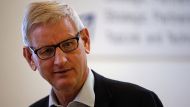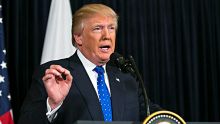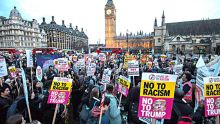President Donald Trump has continued to spotlight Sweden's immigration policies, using Twitter to sardonically suggest the Scandinavian country's acceptance of new migrants or refugees is not working.
Give the public a break - The FAKE NEWS media is trying to say that large scale immigration in Sweden is working out just beautifully. NOT!
— Donald J. Trump (@realDonaldTrump) February 20, 2017
More World News Videos
Sweden to Trump: When you are in a hole, stop digging
After Donald Trump's apparent reference to a non-existent incident in Sweden raises eyebrows, the US President doubles down on his claim Sweden's immigration policy is "working out just beautifully. NOT!"
People in Sweden have been scratching their heads since President Trump suggested during a rally on Saturday that some sort of incident had occurred in their country.
"You look at what's happening," he said at the rally. "We've got to keep our country safe. You look at what's happening in Germany, you look at what's happening last night in Sweden. Sweden, who would believe this?"

The comment provoked confusion and humour in Sweden and around the world.
"Sweden? Terror attack? What has he been smoking? Questions abound," Carl Bildt, a former prime minister and foreign minister, wrote on Twitter.
On Sunday, the US president clarified he was referring to something he saw on television, apparently a segment aired on Friday night on the Fox News Channel show Tucker Carlson Tonight that reported Sweden had accepted more than 160,000 asylum-seekers last year but that only 500 of the migrants had found jobs in Sweden. The report went on to say that a surge in violence had followed.
Sweden processed 81,000 asylum seekers in 2014, 163,000 in 2015 and 29,000 last year, with another 25,000 to 45,000 expected this year, according to the Swedish Migration Agency.
Henrik Selin, a political scientist and deputy director of the Swedish Institute, a state agency dedicated to promoting Sweden globally, completed a study recently focusing on negative news reports about Sweden's acceptance of refugees. It found numerous exaggerations and distortions, including false reports that Sharia law was predominant in parts of the country and that some immigrant-heavy neighbourhoods were considered "no-go zones" by police.
After the president's latest tweet, Mr Bildt appeared to weigh in again, tweeting that "when you are in a hole, stop digging". Mr Bildt also tweeted a comparison of murder rates between Orlando, Florida and all of Sweden.
Just a piece of friendly advice: when you are in a hole, stop digging.
— Carl Bildt (@carlbildt) February 20, 2017
Pence reassures Europe
The tweet came as Vice President Mike Pence travelled to Europe to visit NATO and the European Union - an organisation whose partial disintegration President Donald Trump has hailed - to tell anxious officials that Mr Trump actually supports the 28-nation bloc.

Vice President Mike Pence, left, and NATO Secretary General Jens Stoltenberg on Monday. Photo: AP
"The president did ask me to come here to Brussels to the home of the European Union and deliver an additional message," Mr Pence said on Monday while standing next to Donald Tusk, president of the European Council and a former prime minister of Poland. "So today it's my privilege on behalf of President Trump to express the strong commitment of the United States to continued cooperation and partnership with the European Union."
Last year there were app 50% more murders only in Orlando/Orange in Florida, where Trump spoke the other day, than in all of Sweden. Bad.
— Carl Bildt (@carlbildt) February 20, 2017
Smiles and handshakes abounded before and after Mr Pence delivered his reassuring words, but Europeans - taken aback by Mr Trump's occasional fulminations against European institutions that had long been the bedrock of US policy here - were still wary.
In January, Mr Trump called the EU "basically a vehicle for Germany," language that stunned leaders of the bloc, which has been struggling with economic malaise, migration and Britain's intention to withdraw. Days later, Mr Tusk, who represents the union's 28 national leaders, described Mr Trump's bombastic and sceptical language as a potential threat to European unity alongside Russian aggression, Chinese assertiveness and Islamist terrorism.
On Monday, after meeting with Mr Pence, Mr Tusk said he felt reassured. In a detailed statement, he said he had asked Mr Pence whether the Mr Trump administration was committed to maintaining an international order based on rules and laws; whether Mr Trump was committed to NATO and to "the closest possible trans-Atlantic cooperation"; and whether Europe could count "as always in the past, on the United States' wholehearted and unequivocal, let me repeat, unequivocal support for the idea of a united Europe."
"In reply to these three matters," Mr Tusk said, "I heard today from Vice President Pence three times 'yes'! After such a positive declaration, both Europeans and Americans must simply practice what they preach."
Mr Trump's unpredictable presidency has upended Washington, where his rambling and grievance-filled news conferences, chaotic decision-making and thin staffing levels have left much of the capital uncertain how to manage the earthquake he has wrought. The aftershocks swept across Europe, leaving those who depend on the United States for security and vital economic ties uncertain about where they stand, particularly in the face of a resurgent Russia.
A cavalcade of surrogates for Mr Trump - Defense Secretary Jim Mattis, Secretary of State Rex W. Tillerson and now Mr Pence - have come to Europe in recent days to try to settle nerves here. Their speeches have helped.
But nobody is quite sure whether these surrogates truly speak for Mr Trump or whether, even if they do, Mr Trump might soon change his mind.
"Of course European Union officials are happy to have Pence here, and they are happy about what he said, but that's not going to cancel out the deep and lingering doubt in many other European capitals about what the White House and President Trump actually want," Guntram B. Wolff, director of Bruegel, a research organisation in Brussels, said in a telephone interview. "What Europe still has to do is to be prepared for the worst, and to try to work with partners around the world to support and defend multilateralism, and to do so without being antagonistic."
Among the concerns shared by many European policymakers is the possibility that the Trump administration will impose protectionist tariffs as part of the president's goal of bringing jobs back to the United States.
In brief remarks before his own meeting with Mr Pence, Jean-Claude Juncker, the president of the European Commission, the executive arm of the EU, warned that the United States was more dependent on Europe than was commonly believed.
"The US economy is depending more than some in the US would think on the exchanges, the trade volumes, including Indiana, by the way, between the US and the European Union," Mr Juncker said, referring to the state where Mr Pence was governor before becoming vice president.
While wary about looming protectionist measures, officials in Brussels are hoping that the United States' retreat from global trade deals will spur European efforts to be more of a global commercial power. The bloc recently struck a wide-ranging trade deal with Canada and could reach deals with other countries now unlikely to do so with the United States.
Mr Pence told NATO that the president expects by the end of the year "real progress" among NATO allies to step up their defence spending towards the minimum criteria of two percent of their economic output.
Speaking at NATO headquarters in Brussels, Mr Pence said: "America will do our part but European defence requires European commitment as much as ours... The president expects real progress by the end of 2017."
The New York Times, AP












